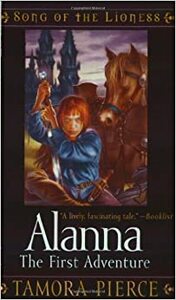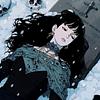Take a photo of a barcode or cover
adventurous
challenging
funny
tense
fast-paced
Plot or Character Driven:
A mix
Strong character development:
Yes
Loveable characters:
Yes
Diverse cast of characters:
Yes
Flaws of characters a main focus:
Complicated
adventurous
inspiring
fast-paced
Plot or Character Driven:
A mix
Strong character development:
Yes
Loveable characters:
Yes
Diverse cast of characters:
Yes
Flaws of characters a main focus:
Yes
adventurous
fast-paced
Plot or Character Driven:
A mix
Strong character development:
Yes
Loveable characters:
Yes
Diverse cast of characters:
No
Flaws of characters a main focus:
Yes
I absolutely adore everything Tamora has every written. When I was in 6th grade I ordered two hardcover books containing the Alanna series and the Immortal series. I thought they were amazing and they began my love for reading. Since then I have devoured all kinds of books, but Tamora's books will always have a special place. I definitely recommend to parents with children who love medieval settings, animals, special powers and fantasy.
Good book! My partner recommended it as a childhood favourite of theirs, and so I thought I’d give it a read. A great story overall, I’ll be passing the book along to my daughters to read next!
adventurous
mysterious
fast-paced
Plot or Character Driven:
A mix
Strong character development:
Yes
Loveable characters:
Yes
Diverse cast of characters:
Complicated
Flaws of characters a main focus:
Yes
Plot or Character Driven:
Plot
Strong character development:
Complicated
Loveable characters:
Complicated
Diverse cast of characters:
Complicated
Flaws of characters a main focus:
No
I read this story for a summer reading challenge! I feel bad for writing this big long critical review of a children's book, because I'm so clearly not the target audience. But I had sooo many thoughts while reading this relatively short story:
1. I forgot how many middle grade books are focused around the moral of blind obedience and not breaking the "rules." I get here that it's meant to teach kids to work hard for their goals and also to follow basic rules of society. But it also just feels like in this book it's very much treated as "life isn't fair, just do whatever adults say even if it doesn't make sense or doesn't seem right." But despite the whole story existing because Alanna broke a dumb rule (the rule that girls can't be knights), we never address the basic fact that rules can be wrong and not worth following-- maybe this is just because Alanna is like twelve and can't see the flaws in her environment yet? This could be something that is explored in more depth in later books.
2. The feminism. It feels very much like basic "girl power" feminism that tells girls if they work really really hard, they can be just as good as boys! Which makes sense, I guess, because it is for children who aren't like, well versed in feminist political theory. But personally, I just think that kind of thinking is flawed-- it shouldn't be that women can be "as good as men" if they work really hard, it should be that people across all types of genders have various strengths and weaknesses. It was also weird how adamant the narrative was that Alanna do everything herself, a very "independent woman" attitude. I guess the moral here is that girls can do stuff on their own without boys helping them, but it often just felt like it was saying you shouldn't accept any help at all-- a very "pull yourself up by the bootstraps" conservative type of mentality.
3. The portrayal of gender. Despite this being a "girl disguised as a boy" story, this book is quite cisnormative and doesn't really have a lot to say about Alanna's relationship with gender. With any crossdressing-to-fight story, the central question around gender is often whether the character hates being a women and wants to be a man or if they hate the role women are forced to play in society. There's a lot of really interesting grey area to explore there (I think She Who Became the Sun explores this excellently), but none of that is really explored in this book. Alanna clearly just wants to be a knight and doesn't actually struggle with gender or being a woman (at least right now), and while that's less interesting there's not necessarily anything wrong with that.
However, the mildly transphobic thing to me was that whenever Alanna complains about being a girl, the people around her are just like "WELL YOU WERE BORN A GIRL AND YOU CAN NEVER CHANGE THAT SO JUST SUCK IT UP!!!!!!", like wtf. I'm not expecting anyone in this 1983 fantasy novel to encourage her to go on puberty blockers and transition, but it was so weird that instead of assuring her that being a girl doesn't mean she's inherently less than a boy or that she can still achieve her dreams as a girl, they just are like yeah it sucks, but there's no changing it. Transphobia aside, I just hate the message that being a woman is suffering and agony and you just have to struggle through it as opposed to championing women's equality and fighting for their freedom and acceptance in society.
And of course, the two characters who I'm assuming are her future love interests (both about 6-7 years older than her and meeting her when she's 11, btw) find out she's a girl pretty early on, because we absolutely cannot have any gay shit down the line!
This is a story that could definitely get a lot more complex down the road in terms of its portrayal of feminism and gender, and I would have absolutely loved this book if I read it as a child. As an adult, I found it to be a fun time but disagreed with some of the messaging.
1. I forgot how many middle grade books are focused around the moral of blind obedience and not breaking the "rules." I get here that it's meant to teach kids to work hard for their goals and also to follow basic rules of society. But it also just feels like in this book it's very much treated as "life isn't fair, just do whatever adults say even if it doesn't make sense or doesn't seem right." But despite the whole story existing because Alanna broke a dumb rule (the rule that girls can't be knights), we never address the basic fact that rules can be wrong and not worth following-- maybe this is just because Alanna is like twelve and can't see the flaws in her environment yet? This could be something that is explored in more depth in later books.
2. The feminism. It feels very much like basic "girl power" feminism that tells girls if they work really really hard, they can be just as good as boys! Which makes sense, I guess, because it is for children who aren't like, well versed in feminist political theory. But personally, I just think that kind of thinking is flawed-- it shouldn't be that women can be "as good as men" if they work really hard, it should be that people across all types of genders have various strengths and weaknesses. It was also weird how adamant the narrative was that Alanna do everything herself, a very "independent woman" attitude. I guess the moral here is that girls can do stuff on their own without boys helping them, but it often just felt like it was saying you shouldn't accept any help at all-- a very "pull yourself up by the bootstraps" conservative type of mentality.
3. The portrayal of gender. Despite this being a "girl disguised as a boy" story, this book is quite cisnormative and doesn't really have a lot to say about Alanna's relationship with gender. With any crossdressing-to-fight story, the central question around gender is often whether the character hates being a women and wants to be a man or if they hate the role women are forced to play in society. There's a lot of really interesting grey area to explore there (I think She Who Became the Sun explores this excellently), but none of that is really explored in this book. Alanna clearly just wants to be a knight and doesn't actually struggle with gender or being a woman (at least right now), and while that's less interesting there's not necessarily anything wrong with that.
However, the mildly transphobic thing to me was that whenever Alanna complains about being a girl, the people around her are just like "WELL YOU WERE BORN A GIRL AND YOU CAN NEVER CHANGE THAT SO JUST SUCK IT UP!!!!!!", like wtf. I'm not expecting anyone in this 1983 fantasy novel to encourage her to go on puberty blockers and transition, but it was so weird that instead of assuring her that being a girl doesn't mean she's inherently less than a boy or that she can still achieve her dreams as a girl, they just are like yeah it sucks, but there's no changing it. Transphobia aside, I just hate the message that being a woman is suffering and agony and you just have to struggle through it as opposed to championing women's equality and fighting for their freedom and acceptance in society.
And of course, the two characters who I'm assuming are her future love interests (both about 6-7 years older than her and meeting her when she's 11, btw) find out she's a girl pretty early on, because we absolutely cannot have any gay shit down the line!
This is a story that could definitely get a lot more complex down the road in terms of its portrayal of feminism and gender, and I would have absolutely loved this book if I read it as a child. As an adult, I found it to be a fun time but disagreed with some of the messaging.
adventurous
lighthearted
fast-paced
Plot or Character Driven:
Character
Strong character development:
Yes
Loveable characters:
Yes
Diverse cast of characters:
No
Flaws of characters a main focus:
Yes
I know understand why Alanna shaped so many childhoods.






